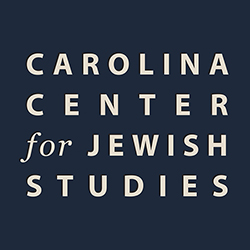Grad Student Research Summer 2020
Plan B: Research from Home
When March rolled in, most of our graduate students had already finalized plans to travel during the summer months to conduct archival research, attend intensive language workshops and present at international conferences. They were all set to work and explore in Israel, Poland, Germany, Switzerland and New York City, but of course, all these travel plans were put on hold. By April, it became clear that students were not giving up on their precious summer months, but instead re-focusing to stay productive even while in their homes. Many students are concentrating on writing and researching dissertation chapters, while others are conducting interviews via Zoom, enrolling in unique online language courses or drafting articles for publication in academic journals. A few students have already sent updates on what they are doing this summer; visit our web site for more examples of student summer research.
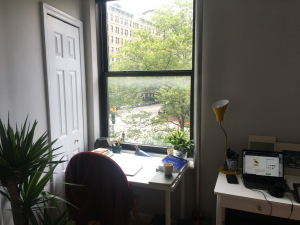 Jo Klevdal, department of English and comparative literature
Jo Klevdal, department of English and comparative literature
I am taking a six-week intensive Yiddish course at YIVO where I am enrolled in a reading class, a grammar class, a conversation class, and a literary seminar titled “Yiddish In/On New York,” which focuses on Yiddish-American literature. In addition to this, I am participating in various Yiddish-based electives (including Yiddish yoga!). With all of these activities, I am involved in some form of Yiddish scholarship from 10am-4pm most days and I am loving every minute of it! Through this experience, I hope to gain proficiency in reading Yiddish which will help further my studies in the role of memory and visual technology in American literature of the early 20th century. (Photo: Klevdal’s cozy “home office with a view” is where she does all her Yiddish coursework.)
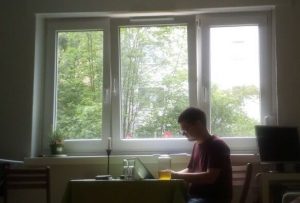 Josh Shelly, department of Germanic and Slavic languages and literatures
Josh Shelly, department of Germanic and Slavic languages and literatures
I am spending the majority of my time reading novels and essays by the German Jewish writer Arnold Zweig. His novel De Vriendt kehrt heim (De Vriendt returns home) and its connection to Theodor Herzl’s Zionist writings is the subject of my next dissertation chapter. In addition, the doctoral students at the Dubnow Institut in Leipzig, Germany recently asked me to contribute to their blog. My short piece on an early Zionist Utopia and the Zionist longing for Europe was recently published under the title “The Other Fatherland”. (The source manuscript is only available in an archive in Jerusalem, and I was first able to access it during a trip to Jerusalem funded by a 2019 summer grant from the Center.) And finally, I will be spending part of this August and September attending a virtual Ulpan hosted by the Hebrew University in Jerusalem. By the end, I will no doubt be proficient in Zooming Be-Evrit! (Photo: Shelly at his “dining table/home office.”)
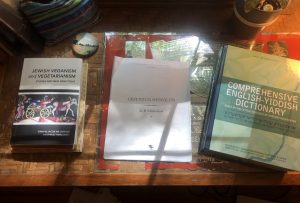 Margaret W. Norman, department of American studies
Margaret W. Norman, department of American studies
I am using this summer to continue working on my Yiddish, after beginning to study with professor von Bernuth this past spring semester. I am taking a weekly course through the Worker’s Circle summer Yiddish program. I also am challenging myself with a small translation project: recipes from a 1930’s vegetarian cookbook, “Gezunt Un Shpayz.” I plan to test a few of my translated recipes at the end of the summer, and to write about the experience. (Photo: Norman’s summer project will soon move from her desk to her kitchen.)
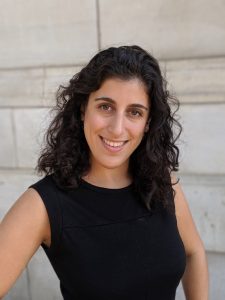 Daniela R.P. Weiner, department of history
Daniela R.P. Weiner, department of history
In the beginning of summer, I was (virtually) the 2020 Jack and Anita Hess Faculty Seminar Follow-Up Grantee at the Jack, Joseph and Morton Mandel Center for Advanced Holocaust Studies at the United States Holocaust Memorial Museum. I used the museum’s resources to transform my face-to-face “History of the Holocaust” syllabus into an online course. Beginning mid-July, I am teaching a digital course, “Nazis on the Silver Screen,” on the history behind well-known films about Nazism and the Holocaust for the Case Western Reserve University’s Laura & Alvin Siegel Lifelong Learning Program. I am also participating in an Association for Jewish Studies online summer writing group, as I work on a journal article about how the earliest history textbooks—published in the post-fascist successor states of East Germany, West Germany, and Italy between 1949 and 1960—evaluated the relationship between Mussolini’s Italy and Hitler’s Germany during the 1930s.
Congratulations to Daniela, the Center’s Goodman Fellow for 2019-2020. Daniela recently defended her dissertation in the department of history, and the topic of her dissertation is also now a published journal article, titled: American and British Efforts to Democratize Schoolbooks in Occupied Italy and Germany from 1943 to 1949. This fall she is a post-doc fellow at Stanford University.
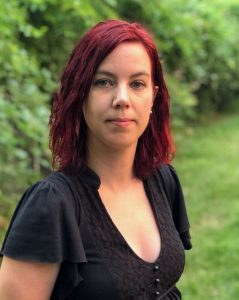 Tine Rassalle, department of religious studies
Tine Rassalle, department of religious studies
Shortly before the spring semester ended I received an email asking me if I wanted to become part of a new initiative called Save the Ancient Studies in America (SASA). SASA is an online project which aims to unite ancient studies graduate students and early career academics to help create a groundswell of interest in this field, particularly for high school and college students. I am an Educational Ambassador, leading a free, online reading group on the Dead Sea Scrolls. We come together once a week for one hour over Zoom to talk about selected readings that I provided. Each week we are tackling a different Dead Sea Scroll or topic that deals with Qumran, the caves, or the Jewish sect of the Essenes. Participants zoom in from all over the world and include high school students, retired people who never had the chance to study the ancient world, and even a Franciscan monk from Indonesia! It is genuinely a lot of fun and just one of the ways in which I feel I can still make an impact and connect with people interested in my field, despite being locked up in my apartment.
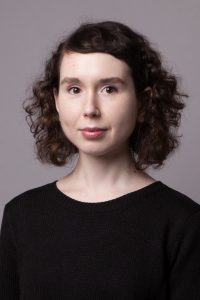 Lea Greenberg, department of Germanic and Slavic languages and literatures
Lea Greenberg, department of Germanic and Slavic languages and literatures
This summer I have been continuing work on the fourth chapter of my dissertation, which looks at the story “The Shylock of Barnow” (1870) by Karl Emil Franzos. I explore how the Jewish daughter is a cipher for questions of modernity and conceptions of Bildung. As the title of the story suggest, the work also includes intertextuality with Shakespeare’s famous play The Merchant of Venice, so it has been interesting tracing the history of the Shylock character and the way his reception has shifted over the years. In addition to working on the dissertation, I am also already busy thinking about and preparing for the upcoming job market—whatever that may (or may not) look like in the coming months. I greatly appreciate the support that the Center for Jewish Studies has provided me in these confusing and unprecedented times. Thank you!
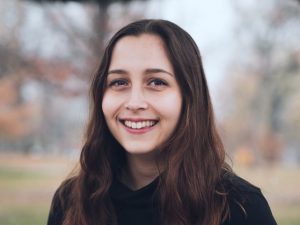 Justine Orlovsky-Schnitzler, department of American studies
Justine Orlovsky-Schnitzler, department of American studies
In June, I started YIVO’s summer Yiddish intensive—offered online for the first time in the program’s history. While immersing myself in this digital Yiddishland, I’ve been finishing research for my critical literature review and preparing to start interviews (via Zoom!) with the subjects of my thesis research project.
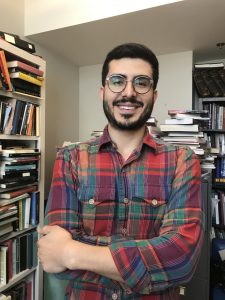 Miguel Vargas, department of religious studies
Miguel Vargas, department of religious studies
I spent the summer preparing for, completing, and defending by doctoral exams and the Religious Studies biblical Hebrew reading and translation examination. I also participated in a month-long language course for conversational ancient Greek. I plan on following up this language program with several online courses in conversational Greek, conversational biblical Hebrew, and other philological topics this upcoming term. I will spend much of my time this upcoming semester reading and translating Egyptian-Jewish literature, in preparation for submitting my prospectus.
